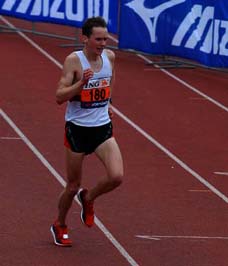Postgraduate awarded Fellowship to help train for the Olympics

A Lancaster postgraduate who aims to compete in the next Olympics has been awarded a prestigious training award from the Royal Academy of Engineering.
PhD student Michael Aspinall is one of only five students in the UK to receive the Student Development Fellowship.
He will receive a £5,000 grant to enable him to attend conferences and present the results of his PhD research on the detection of concealed explosives.
The money will also enable him to train for the 2012 Olympics in London, when he hopes to represent Great Britain.
Michael is currently ranked 17th nationally for the Marathon and ran the fastest UK 20 miles time last year.
This month, he will spend two weeks at one of Kenya’s high altitude training camps to boost his athletic performance before his next series of races.
Michael said the award would be a big help.
“Having the opportunity to continue my PhD and athletic activities with the funds made available to me through the Royal Academy of Engineering Student Fellowship Award is an encouraging and exciting time, in particular my trip to Kenya.
“Mix a full-time PhD with a high intensity training programme, consisting of twice-a-day training, and you have an arduous challenge. I thrive off challenges and love being busy. I feel studying and training complement each other perfectly. You need that ‘escape’ time. When I’ve had a hard day in the office unwinding on a run is great. It works the other way too – sometimes all I want to do is sit down and read an academic paper!”
Michael works on the Distinguish Project, a homeland security collaboration between Lancaster University and the Universities of Manchester and Liverpool. The consortium aims to build a system that enables efficient screening of goods in transit, whether domestic baggage or international cargo. Using nuclear engineering research, suspect items will be exposed to a beam of pulsed neutrons. This will cause the item to emit gamma radiation, which will reveal what elements are inside and whether they are explosive.
Michael’s PhD supervisor Dr Malcolm Joyce, who is leading the project, said: “Michael is a most exceptional character and one of the best research students I have encountered in ten years.
“He has quickly become a significant force in our high-profile project – and still finds time to run 90 miles a week! Somehow he combines these diverse interests and excels at both.”